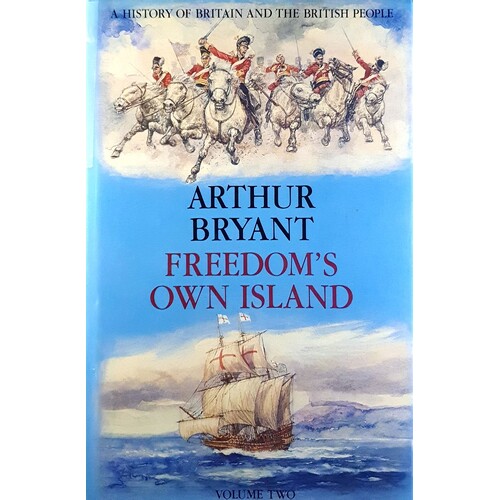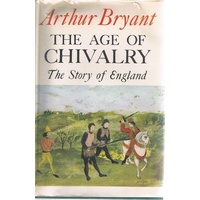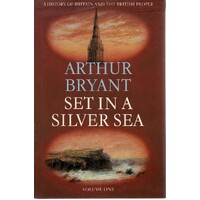Freedom's Own Island. (Volume 2)
Bryant Arthur
Notify me when back in stock
Cover Type: Hardcover
Book Condition: Fine
Jacket Condition: Very Good
Publisher: HarperCollins
Publisher Place: London
Publisher Year: 1986
Edition: First Edition
Description: 568 pages. Jacket is in Very good condition throughout, the only exception is a tear and repair to the top of spine. Book appears to have hardly been read and is in Fine condition throughout.
Publishers Description: Review:"When Sir Arthur Bryant died in January 1985 he was just one month short of achieving his eighty-sixth birthday. He left behind him no less than three substantial historical manuscripts in an advanced state of preparation. One is a biography of Samuel Johnson, described in this volume (rather too often) as the quintessential Englishman, which he was certainly not, unless there are rather more curmudgeonly lexiographers with wildly reactionary political views and Scottish biographers around in England than I have noticed since I started to go there. The Johnson biography is here described as forthcoming, as is apparently the third volume of the sequence of which this is the second: Sir Arthurs history of the British peoples. It was precisely this sort of very sweeping synthesis which undoubtedly earned Sir Arthur the irritated dislike of a substantial proportion of the community of professional academic historians in the United Kingdom. Behind Bryants brilliant prose they felt that there lurked a cavalier approach to evidence; erratic judgement on men and events; and an inadequate acquaintance with the rapidly-changing professional literature of his subject. A survey of reading by Oxford undergraduates in the early 1960s, which established Bryant as their most-read author, was the source of much ironic comment in Cambridge common rooms where their own future Sir Jack Plumb was regarded as teetering on the brink of sensationalism. Cambridge might Plumb the depths, but after that survey the reputation of the Oxford History School seemed buried in the ooze. All of this is of course grossly unfair, at least to Sir Arthur. He started out his literary career with four books of which most professional historians would rightly be proud. His first major work, Charles II, which he published in 1931, was too violently biased in favour of its subject, but it rescued that monarch from the dismissive Whig propaganda which quite wrongly saw him as a man into Nell Gwyn and spaniels but nothing serious. Bryant was lucky to get the commission for his life of Pepys for two other writers turned it down before the offer was finally made to Sir Arthur, but he seized his chance with both hands, writing a three-volume biography which can be read by the most sophisticated of professional historians with pleasure and profit. Incidentally, Pepys also stars in this latest Bryant book as the quintessential Englishman, second only to Johnson. To enter the competition for English quintessentiality you clearly have to have been the subject of a major Bryant biography, so the ratings are now frozen forever at first and close second. Since this particular volume of the trilogy covers the period from the Tudors to the end of the Napoleonic wars, the period above all others close to the authors romantic and patriotic heart, much of it is skilfully-woven pastiche from Bryants earlier works. Some of this book was first published as early as 1942, and some of it may be published again in the forthcoming biography of Johnson. The text is none the worse for that. It is both a Bryant omnibus and something more. It was the something more that posed problems for the author. He could recreate wonderfully the flame-shot murk of the climax of Waterloo. He left no text to fill the very centre of his own historical battle-line. To his Old Tory soul the Revolution of 1688 must have been as fearsome as the sight of the Imperial Guard bearing down at the pas de charge on a gap in the Thin Red Line. Fear not: through the acrid powder clouds of controversy comes the quintessential Yorkshireman John P. Kenyon to plug the gap with a literary flair which matches that of Bryant, and a tough professional mind which leaves the reader in no doubt at all about the lack of any consensus about our political heritage. From the origins of our present political system in the late seventeenth and eighteenth centuries there were always those who feared that it would evolve into something like the bureaucratic, elective, minority-based dictatorship which it has become in the hands of modern premiers. Bryants book has many weaknesses as well as many strengths. It is not a history of the British people (and in any case the correct term is the plural peoples). Apart from a few gestures it is totally Anglocentric, often in an endearingly dotty way. It is also profoundly ambiguous in its underlying message, but that is not a sign of weakness. It is entirely to the authors credit. He was never a mere fugleman for the contemporary Establishment. He opposed policies for which that Establishment went overboard, like Common Market entry. He was so conservative that he could actually sense that there was precious little continuity between the England he lived in and the Old England he loved. It is true that the fellow-historians he mentions tend to be kindred spirits like A.L. Rowse and C.V. Wedgwood, but one startling reference to Lasletts precocious (his critics would say premature) World We Have Lost, reminds us that he did try to keep up with some of the developments in economic and social history. He knew that his England was ruled by a real aristocracy sufficiently frightened of the majority to rule rather tentatively. He even knew that true liberty is usually rather inefficient in the short term, though not in the long. Yet, at the surface level this is a celebration of historical euphoria, of the glories of the Island Race. At another it is a book by a worried man deeply disturbed at the sight of a bridled legislature and of virtually unbridled administrative and physical power in the hand of the arrogantly dogmatic offspring of the upwardly-mobile lower middle class. I wince at the thought of what he may make of the Victorian era, but this is rather a touching note at the end of his long and busy life." - BRUCE P. LENMAN
ISBN: 9780002174114
(203792)





















